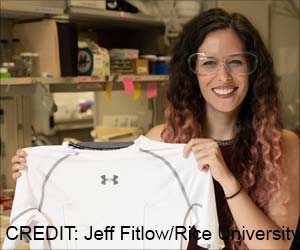Smart shopping carts could save you from a stroke by detecting an irregular heartbeat.
- Atrial fibrillation is a heart rhythm that is irregular and often very fast, which, if undiagnosed, can lead to stroke
- A recent trial showed that sensors in supermarket trolleys can detect atrial fibrillation
- The study highlighted that these smart shopping carts could potentially save lives
Supermarket Carts Can Sense Atrial Fibrillation
"This study shows the potential of taking health checks to the masses without disrupting daily routines," said study author Professor Ian Jones of Liverpool John Moores University, UK. "Over the course of two months, we identified 39 patients who were unaware that they had atrial fibrillation. That's 39 people at greater risk of stroke who received a cardiologist appointment."Atrial fibrillation, the most prevalent heart rhythm problem, affects more than 40 million people worldwide. Atrial fibrillation increases the risk of stroke by a factor of five. These strokes are frequently deadly or severely incapacitating.
Anticoagulation significantly reduces risk, however many people find they have atrial fibrillation after having a stroke. Screening programs are thus required to identify patients with the illness and provide them with preventive medication (1✔ ✔Trusted Source
Supermarket/Hypermarket Opportunistic Screening for Atrial Fibrillation (SHOPS-AF): A Mixed Methods Feasibility Study Protocol
Go to source).
Smart Shopping Carts with Built-In ECG Sensors can Identify Atrial Fibrillation
The SHOPS-AF study looked examined whether electrocardiogram (ECG) sensors embedded in supermarket cart handles could efficiently detect shoppers with atrial fibrillation.During the two-month research, ten carts with sensors in the handles were deployed in four supermarkets with pharmacies in Liverpool.
Customers were instructed to utilize a customized cart and to hold the handlebar for at least 60 seconds. If no abnormal heartbeats were detected, the sensor lit up green. A researcher performed a manual pulse check on these participants to ensure there was no atrial fibrillation.
Red Light Means Stop and Check your Heartbeat
If an irregular heartbeat was detected, the sensor turned red. The in-store pharmacist then performed a manual pulse check and another sensor reading while the subject stood stationary, using an independent bar that was not attached to a cart.The ECG recordings of participants with a red light and/or an irregular pulse were evaluated by the study cardiologist. The results were as follows:
- no atrial fibrillation;
- uncertain ECG and an invitation to repeat the measurement; or
- atrial fibrillation verified and a cardiologist appointment within two weeks
Following an ECG evaluation by the research cardiologist, 115 participants had no evidence of atrial fibrillation, 46 recordings were inconclusive, and 59 people had atrial fibrillation identified.
The average age of the 59 individuals with atrial fibrillation was 74 years, with women accounting for 43%. Twenty already knew they had atrial fibrillation, while the remaining 39 were undiagnosed.
Assessing the Accuracy of the Smart Shopping Carts
The researchers ran three analyses to test the accuracy of screening using this method:- eliminating all 46 ambiguous ECGs;
- assuming all ambiguous ECGs were atrial fibrillation; and
- assuming all ambiguous ECGs were not atrial fibrillation. The sensor's sensitivity ranged from 0.70 to 0.93, while its specificity ranged from 0.15 to 0.97
The negative predictive value ranged from 0.55 to 1.00, implying that this approach would miss roughly half of all occurrences of atrial fibrillation (i.e. false negatives).
Shopping Carts with Sensors Could Save Lives
Professor Jones said, "Nearly two-thirds of the shoppers we approached were happy to use a [cart], and the vast majority of those who declined were in a rush rather than wary of being monitored. This shows that the concept is acceptable to most people and worth testing in a larger study. Before we conduct SHOPS-AF II, some adjustments are needed to make the system more accurate. For example, having a designated position on the bar to hold onto, interfered with the readings. In addition, ESC Guidelines require just a 30-second ECG to diagnose atrial fibrillation, so we aim to find a sensor that will halve the time shoppers need to continuously hold the bar."He concluded, "Checking for atrial fibrillation while people do their regular shopping holds promise for preventing strokes and saving lives. A crucial aspect is providing immediate access to a health professional who can explain the findings and refer patients on for confirmatory tests and medication if needed."
Reference:
- Supermarket/Hypermarket Opportunistic Screening for Atrial Fibrillation (SHOPS-AF): A Mixed Methods Feasibility Study Protocol - (https://pubmed.ncbi.nlm.nih.gov/35455694/)
Source-Medindia
















